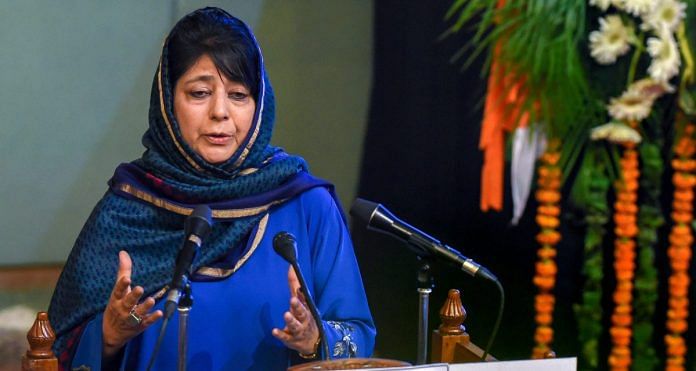The SC is set to hear petitions calling for the scrapping of the provision, which has raised fears in the Valley
New Delhi: On 7 August, the Supreme Court will hear petitions questioning the validity of the Article 35A, which grants special rights to the people of Jammu and Kashmir. The state, already on the edge, could face another crisis if this controversial provision is amended.
There have already been peaceful protests by trade bodies, religious and educational groups in the Valley over fears that the provision could get scrapped. The legal wrangling is being viewed as an attack on the fundamental rights of the people of J&K.
All the major political parties in J&K, barring the BJP, have already pledged to protect Article 35A. On Friday, former chief minister Mehbooba Mufti warned that “fiddling” with the special status will “have catastrophic ramifications” for the country.
“Today people cutting across party lines & other affiliations are united in their fight against any dilution of Article 35 A. As I have already stated before, fiddling with J&Ks special status will have catastrophic ramifications for the entire country,” she tweeted.
What is Article 35A?
A controversial constitutional provision, Article 35A grants special rights to the “permanent residents” of Jammu and Kashmir. As per the provision, it is the state legislature that defines who qualifies to be the “permanent resident”.
The “permanent residents” get certain rights and privileges including employment in the state government, acquisition of immovable land or property, scholarships and other such aid and welfare from the government.
Also read: Legal ground under J&K special status getting shaky in Supreme Court
This order was issued under Article 370 (1) (d) of the Indian Constitution, which mandated that the other provisions of the Constitution can apply to the state.
Why and how was it formed?
It was enacted through a Presidential Order in 1954 by the then president of India, Rajendra Prasad. This constitutional order followed the Delhi Agreement of 1952, signed between former Prime Minister Jawaharlal Nehru and then Chief Minister of Jammu and Kashmir Sheikh Abdullah. The agreement upheld the internal rights of the state’s subjects thus making it intrinsic to the accord between India and Jammu and Kashmir.
Debate, demands and controversy
The debate on Article 35A began after the Delhi-based NGO, We the Citizens, filed a petition in the Supreme Court in 2014 saying that 35A was a “temporary provision” that needed to be scrapped.
Lawyer Charu Wali Khanna then stirred further debate after she filed a petition claiming that the provision was discriminatory towards women, particularly for the right to property. As of now, there are a total of four petitions challenging the constitutionality of the provision in the apex court.
The SC bench headed by Chief Justice Dipak Mishra has been hearing the case.
Those in favour of striking down Article 35A, including the BJP, argue that it will allow people from outside the state to settle in J&K, own property and also give them a right to vote. This, they say, would lead to the integration of the state with the rest of the country.
Another argument is that it is anti-women. Khanna’s petition underlined the fact that women from the state who marry non-Kashmiris lose their rights as subjects of the state. Supporters of 35A say this is not true and had been settled by a full bench of the Jammu and Kashmir High Court in the State of J&K v Dr Susheela Sawhney (2002).
J&K defends Article 35A
The fears in the Valley are that the challenging of 35A is a precursor to diluting Article 370, which grants J&K autonomous status. There is also a view that it is an attempt to change the demography of the Muslim-majority state.
Also read: BJP wants to revoke Article 370, ironically Sardar Patel was its architect
The legal battle has united the state, with all major political parties vowing to protect both Article 35A and Article 370.




“Obviously this is a bigger one, but the best battles are given to the best warriors.”
It proves the biased view of particular community. In J&K they are not allowing to settle rest of the Indians, but at the same time they are supporting illegal migrants all over the country.
Scrap it.Actually this article is mainly responsible for the continuous unrest in the valley leading to lack of integration of the state with rest of the country leading to the so called K-problem of last 70 yrs.
Never give any Special status for any States in India.Forget old stiries and scrap 370 and 35a articles.Handover j&k to Army. Old netas do everything for their own selfish gains. It is not mandatory to follow these opportunists.